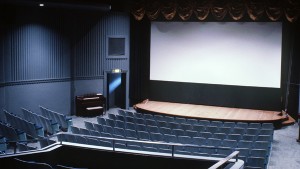Recently, the Dryden Theatre at the George Eastman House gave Rochester one of the more remarkable movie experiences in recent memory. On Friday, April 5, the Dryden showed a restored print of the revered Hollywood epic, “Ben-Hur.” The following night, the Dryden welcomed award-winning director James Ivory, who spoke about his distinguished career and screened his classic film, “Jefferson in Paris.” It is safe to say that the Dryden, having been closed for renovations during the winter, is back in action. The old seats, which were not particularly comfortable, have been replaced with superior (and well-cushioned) new chairs. The faded, decades-old drapes that once haunted the theater walls are gone, and rich, dark blue tapestries hang in their place. Finally, the sound and projection systems are as crisp as ever, proving that you don’t need to see an IMAX movie to have an immersive cinematic experience. The films screened last weekend could not have been more different from each other. “Ben-Hur,” the most spectacular of all the old sword-and-sandals pictures, is a highly stylized adventure film. It is a four-hour extravaganza with overture, intermission, and entr’acte, much like an opera. Additionally, “Ben-Hur” is an exercise in the power of pure narrative it is the thrilling story of one Jewish merchant, Judah Ben-Hur (played powerfully by Charlton Heston), as he suffers imprisonment at the hands of the Romans and eventually gets his revenge.
Conversely, “Jefferson in Paris” avoids one central plot in favor of a series of anecdotes about Thomas Jefferson’s time in France, especially his relationship with his slave, Sally Hemings. “Jefferson” was shot with documentary-style realism and is as naturalistic as “Ben-Hur” is stylized. Nonetheless, the two films share some thematic similarities. Both films are about families experiencing eras of great historical change, and both films focus heavily on travel. James Ivory’s Q&A session after the “Jefferson” screening also involved much discussion of travel, which included his trips to India, China, and France for filming. As such, the weekend’s programming at the Dryden felt like a unique blend of travelogue and history lesson.
Of the two films shown last weekend, “Ben-Hur” was the more satisfying cinematic experience. When seen on home video, “Ben-Hur” is enjoyable but somewhat diminished. You can pause it and walk away whenever you like, and the film’s religious themes seem corny. But on the big screen, “Ben-Hur” is overwhelming and, like an opera, larger than life. Since the image is so big, the emotions, the colorful cinematography, and the story also become grander. The religious themes are still dated, but the actors are so earnest, so towering in their performances that this Biblical epic no longer seems hackneyed. Rather, it becomes the cinematic equivalent of great religious art.
“Jefferson in Paris” was certainly enjoyable. Unlike most films about the American and French revolutions, “Jefferson” emphasizes the culture of the era rather than the politics. Nick Nolte gives a surprisingly graceful and intelligent performance as Jefferson, showing how the statesman grew from being reserved to much more emotionally honest during his time in Paris. However, Jefferson also leaves Paris more conservative than when he arrived. He denies his daughter the opportunity to follow her heart and remain in France, and he commits to a manipulative relationship with an underage slave.
This sense of ambiguity in Jefferson as both a sympathetic and repulsive figure is thought provoking. Unfortunately, the film covers so much historical ground that it feels unfocused. In the end, you’ve learned much about slavery, the French Revolution, French culture, and the limits of American radicalism, but you’re not sure what the central theme is supposed to be. “Jefferson” was therefore much less fun to watch than “Ben-Hur.”
And what of Ivory’s presentation? Ivory was utterly charming, displaying a dry sense of humor and a real interest in accurately conveying a little-known era of American history. He acknowledged the immense controversy surrounding the release of his film, which was the first to dramatize the Jefferson-Hemings relationship.
“The things we show Jefferson saying and doing -— [some] people have never forgiven us for it,” Ivory remarked. He also conveyed his personal enthusiasm for classic films — he was in the audience for part of the “Ben-Hur” screening and praised his three favorite contemporary directors: Martin Scorsese, Woody Allen, and Wes Anderson.
Interestingly, Ivory didn’t take any particular seat of honor while his film was shown — this master filmmaker sat in the back row of the orchestra section, as both a sign of his solidarity with ordinary moviegoers and a testament to the superior theatergoing experience provided by the Dryden.
Gorman is a member of the class of 2014.






